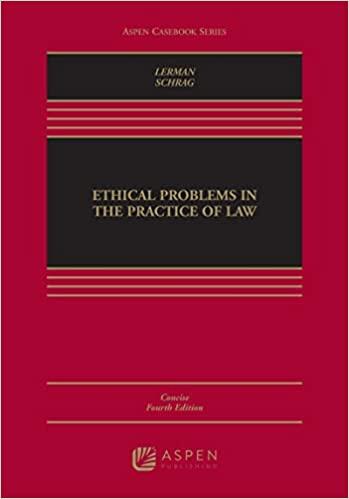Question
explain the features of different types of trust Equitable principles that govern the creation, validity and failure of public trusts (charities) - Meaning and interpretation
explain the features of different types of trust
Equitable principles that govern the creation, validity and failure of public trusts (charities)
- Meaning and interpretation of charitable purpose (Pemsel's categorisation, new heads under Charities Act 2006, Charities Act 2011)
- Meaning and application of public benefit including discussion regarding the Charity Commission's role and its guidance on public benefit
- Meaning and application of the clause 'wholly and exclusive charitable' The doctrine of cy-pres (initial failure and subsequent failure).
The concept and application of constructive trust
- Nature of constructive trusts - remedial v institutional constructive trusts, consequences of classification
- Fiduciary duties - non-conflict and non-profit rules, duty to act without remuneration and exceptions, self-dealing, fair- dealing, corporate opportunity doctrine, equitable principles dealing in the context of bribery, defences to breach of fiduciary duties, equitable remedies for breach of fiduciary duties, distinction between personal and proprietary liability
- Third parties' liabilities - dishonest assistance (conditions for liability, meaning of assistance, meaning of dishonesty (objective, subjective, combined objective & subjective tests, semantic v substantive differences, remedies; receipt based liability (conditions for liability, requirement of mental state, different types of knowledge, meaning of unconscionability in this context, distinction between knowledge and unconscionability, meaning of beneficialreceipt; remedies
- Differences between strict and fault-based liabilities.
The concept of resulting trusts
- Circumstances in which resulting trusts apply
- failure of trust, presumed intention of the parties, failure to dispose of full beneficial interest, dissolution of unincorporated association Presumption of resulting trust
Presumption of advancement in the context of Equalities Act 2010
- Theories that aim to explain the reasons for why resulting trusts exist as opposed to
when it will arise
- presumed intention, automatic resulting trust, prosulting trust, lack
of intention to benefit third party, Swadling, Penner, Millett and Birk's theories
- The concept of unjust enrichment
- The principles of Qustclose trust and theories explain its compatibility (or lack of it)
with orthodox equitable rules.
jurisdiction England and Wales, references to case law and statutory provisions.
Step by Step Solution
There are 3 Steps involved in it
Step: 1

Get Instant Access to Expert-Tailored Solutions
See step-by-step solutions with expert insights and AI powered tools for academic success
Step: 2

Step: 3

Ace Your Homework with AI
Get the answers you need in no time with our AI-driven, step-by-step assistance
Get Started


